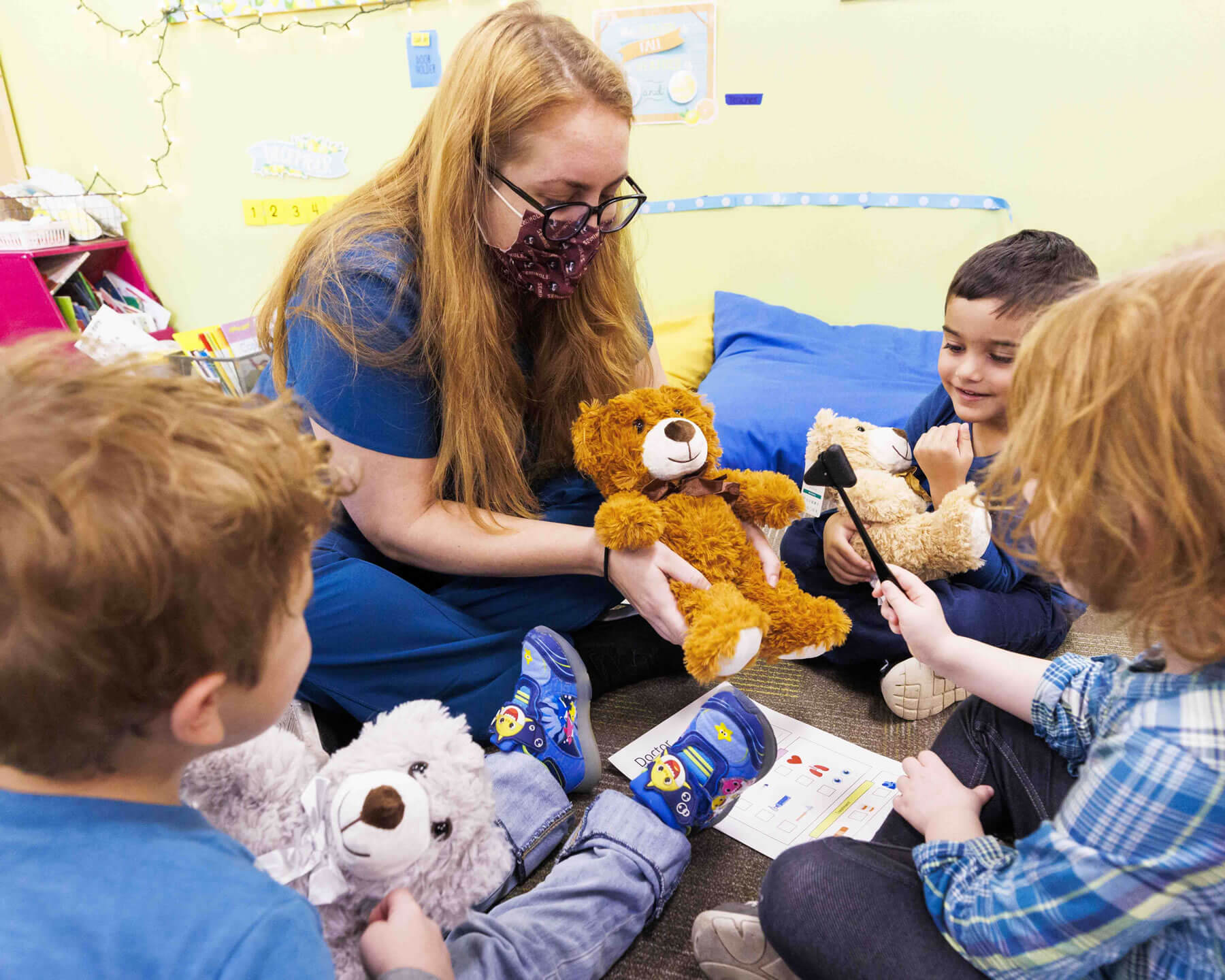Teddy Bear Clinic helps ease kids' anxiety about doctor visits


“What happens when you go to the doctor?” first-year medical student Sean Gabany asked the group of preschoolers sitting on the floor in front of him.
“You get a shot,” several said sadly, the memory obviously still unpleasant.
Gabany smiled and said, “It’s not always about shots. There’s a lot more to it. But shots are important to protect us from getting sick.”
He and his student colleagues – first- and second-year M.D. students from the Florida State University College of Medicine – are part of the Pediatric Interest Group (P.I.G.). Using the teddy bears P.I.G. bought to give the children, the med students showed the children at the FSU Childcare and Early Learning Program the basics of a health exam. President Taylor Posey said teaching children not to fear a trip to the doctor should begin at an early age. As the children who responded to Gabany’s question showed, going to the doctor at their age often involves something that hurts, even if just for a minute. “Teddy Bear Clinics,” held all over the country and begun at FSU by the Family Medicine Interest Group in 2018, seemed to Posey to be a good foundation on which to build positive relationships.
Research has shown that children benefit from exposure to real medical equipment and the opportunity to manipulate it, as opposed to fake doctor toys, Posey said. “Pretend medical play on stuffed animals has been shown to reduce health care-related fear and anxiety, as well as increase medical knowledge in children.”
“The pandemic prevented us from interacting with the children in our community the past couple of years,” she said. “When the opportunity came about to volunteer in person at the FSU Childcare and Early Learning Program, we felt it was important to take advantage of it, so the kids will not be afraid and learn to trust their health-care providers.”
Mary Pfost Norton (M.D., 2013), an assistant professor of pediatrics and faculty P.I.G. advisor, said building that patient-doctor trust has become even more important over the past few years.
“There has been an erosion of trust in our institutions,” she said. “We’ve seen it in clinic. The relationship between physician and family has changed. When we were kids and the doctor said to do something, our parents did it.”
Norton said today’s students are learning to meet people where they are, to facilitate and encourage parents to collaborate on their children’s care, which leads to trust.
“I am incredibly proud of them,” she said.
A total of 26 College of Medicine students, wearing scrubs and stethoscopes to reinforce the image of a health-care provider, participated in the December clinic at the FSU Childcare and Early Learning Program.
Five classes – one toddlers, two “tweeners” and two pre-K – with eight to 13 children in each were visited by a team of four student volunteers and a student team leader, who worked with the class teacher. The activities were geared toward specific age groups. While the toddlers (2 year-olds) painted white handprints on black craft paper to mimic an X-ray image, the “tweens” (3 year-olds) put together paper folders that served as “doctor bags” with pictures of the various implements doctors use, such as stethoscopes, reflex hammers and thermometers. The preschoolers (4 year-olds) gave their bears physical exams. Under the supervision of the med students and their teachers, they used otoscopes, blood pressure cuffs, stethoscopes and eye charts.
“We learn through play,” said Tiffany Karnisky, the center’s associate director. “It’s experiential learning.”
The center’s philosophy of learning dovetails perfectly with the College of Medicine’s philosophy of experiential training and learning. The P.I.G. members, all of whom have an interest in pediatrics as a specialty, got to practice building trust with young patients, and the children got to practice making sure their bears stay healthy – even if it meant getting a shot.
“The goal of the clinic was to expose children to real medical equipment and teach them what it is used for in a safe manner,” Posey said. “We were happy to succeed in this mission.”
Med student Madikay Faal was touched by the innocence of the children in general.
“Seeing their eyes light up was really something special,” he said, “and their being super-curious about everything and intent on their mission was a bit contagious.”
Contact Audrey Post at audrey.post@med.fsu.edu

